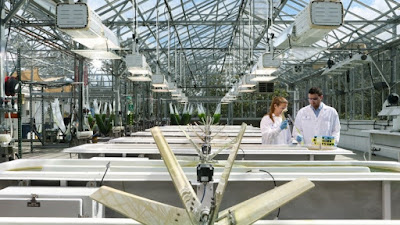ExxonMobil and Synthetic Genomics enter a new phase of their joint algae biofuel research program
Type of post: NEWS IN BRIEF.
ExxonMobil is
actively engaged in the research on advanced biofuels, partnering with universities,
laboratories and other companies. Its alliance with Synthetic Genomics Inc. to produce oil from algae to be used as a renewable, lower-emission
alternative to traditional transportation fuels is one of the most known examples.
The partnership started in 2009. Last year, a major breakthrough of their
research program was published in Nature Biotechnology: a modified algae strain
that double its lipid fraction of cellular carbon compared to the parent without
significantly inhibiting the strain’s growth (a genetic switch allows to regulate
the conversion of carbon to oil in the algae).
Figure 1. Synthetic Genomics’ scientists uses
advanced cell engineering technologies (extracted from ExxonMobil website)
Now, they have just announced a new phase in
their joint algae biofuel research program (see press release, 6/3/2018). This new phase includes
an outdoor field study that will grow naturally occurring algae in several
contained ponds in California. The research will enable ExxonMobil and
Synthetic Genomics to better understand fundamental engineering parameters (for
instance, viscosity and flow), which cannot easily be replicated in a lab. The
results of this work are important to define how to scale the technology and
create a perfect stepping stone to lay the foundation for a large scale
commercial deployment of the technology in the future.
Both companies are continuing with fundamental
research on algae biology in their laboratories as the field study advances.
ExxonMobil anticipates that 10,000 barrels of algae biofuel per day could be
produced by 2025 based on research conducted to date and emerging technical
capability.





